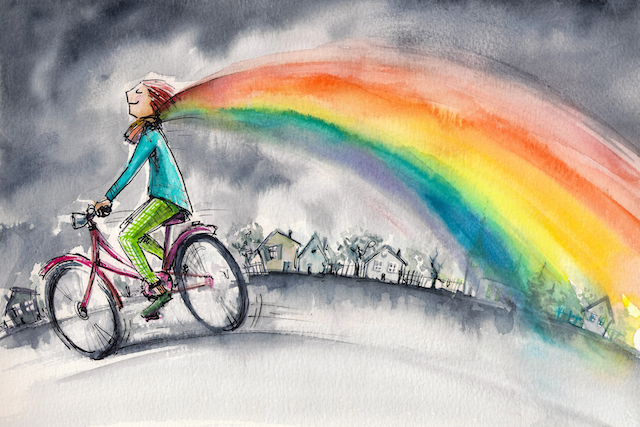
“No one is useless in this world who lightens the burdens of another.” ~Charles Dickens
When I was seven years old, my parents had me take an IQ test for an application to a private school near our new home.
I vaguely remember sitting with the proctor, answering question after question about vocabulary and spatial recognition. To seven-year-old me, the test was nothing more than a fun logic puzzle, and I delighted at each question I knew the answer to, bright eyed and enthusiastic.
While I don’t recall my exact score, the numbers were unusually high—in fact, so high that the proctor expressed her surprise to my parents that I was not suffering from some form of high-functioning autism.
From age seven on, I was placed in the most gifted classes in both public and private school. I enjoyed the challenge, and the attention I received, until I became a teenager.
In my transition to adolescence, I became aware of the incredible teenagers around the world writing novels, promoting peace, and inventing the types of machinery and technology that change the world.
These individuals inspired me, but secretly implanted a deep sense of fear and angst in my mind.
For as long as I could remember, people had been telling me, “Avery, you are going to do amazing things with your life,” while I spent my life like any other teenager: school, sports practice, homework, food, bed, repeat. I was not accomplishing any great feats.
I slowly began to feel like I was failing to fulfill my full potential as a human being.
Being exceptionally gifted, once a joy and privilege, had become a toxin to my emotional well-being. I was all consumed by my ego telling me that I should be more—or I was wasting my intellect.
This led me to sporadically start novels, blogs, articles, anything to prove myself worthy of my intelligence. I would give up on each one quickly and move on to my next idea, as unsuccessful as the first.
No matter what I tried, the world still did not know my name—the only thing, I thought, that could make feel adequate.
About a year ago, it dawned on me that my pattern of self-dissatisfaction and disappointment was unsustainable.
No matter what I did, no matter how many people knew my name, it made no difference. I always craved more, and anything less than becoming the next Einstein was a personal failure.
So, with that in mind, I began the arduous process of redefining success in my life. The only way I could do this, I learned, was to help others realize their own goodness.
I began with my personal mantra:
“It is better to change one person’s life than to have 1,000 know your name.”
I stumbled upon this realization somewhat suddenly, after taking a two-week long trip with my grade. I invested myself in helping my friends with sickness and fear, and I came away changed; I finally felt like I’d accomplished something permanent and meaningful.
Instead of living for recognition from the world, I began to look for satisfaction through my personal relationships. I no longer needed to change the world to be successful; I just needed to know that I had changed someone’s life for the better.
Surprisingly, this is a relatively easy task to accomplish with discipline. By investing myself in relationships with my friends, acquaintances, and partner, I began to receive incredible feedback.
People genuinely began to thank me—not for being kind, but for literally changing their lives.
The key for me was genuinely listening to others, and caring about their needs and opinions. Helping people came naturally to me, and remains the best gift I can give to others; not some profound piece of writing or technological advancement.
Typically, the people around me who I listened to had similar issues of inadequacy. I was not alone. They too believed themselves to be failures, unable achieve their potential, whether that potential was straight A’s or a sports scholarship or being kind.
I could see the innate goodness of the people around me shining through, and it pained me to see them suffer from feelings of inadequacy. I knew, deep down, that everyone around me was good and pure and beautiful, as all children of this earth are.
As a result, I realized through time that if the people around me were all beautiful and good, as all people are, then I must be good too—just the way I am and always will be.
By loving others, I had already achieved my purpose on this earth: to be the inherently sympathetic and kind creature that all human beings are.
I now actively seek people around me who need my care, and indulge them when necessary. Love has taken precedence in my life over material accomplishment, as it truly should. I have closer, more meaningful relationships, more acquaintances, and an exponentially higher self esteem.
The beauty is, people reciprocate genuine love: the people you help will be there for you in your times of need, too. Love is a self-fulfilling prophecy that can only be positive for all parties involved.
At the end of the day, people simply want to receive love and attention; and through giving others these things, I not only improved their lives but also my own perception of myself.
I was able to focus on the immediate positive impact my life was making on that of others, and I finally felt purposeful and that I was leading a meaningful life.
The truth is, not everyone can change the entire world, and not everyone needs to. All we can do is give as much love in our lives as possible, treat ourselves kindly, and leave the world a more positive place than we entered it.
That is all I can ask of myself, and I try to leave all other expectations of myself behind—the ones of impermanent success that can only bring me dissatisfaction and suffering.
Maybe thousands do not know your name, but you have the power to completely change the lives of those around you with love; and that, I’ve learned, is far more gratifying and important.
About Avery Rogers
Avery Rogers is a high school student in California. She aspires to be an author, spiritual writer, and neuroscientist when she grows up. She is the creator and host of the Brainstorms Podcast, a neuroscience podcast for teenagers. She also runs a personal blog about love, spirituality, and the meaning of life at on her blog Pluto’s Journal.













 Though I run this site, it is not mine. It's ours. It's not about me. It's about us. Your stories and your wisdom are just as meaningful as mine.
Though I run this site, it is not mine. It's ours. It's not about me. It's about us. Your stories and your wisdom are just as meaningful as mine.
Beautifully written
BEAUTIFUL!!!!!!! 🙂 Thank you for sharing your experience and lovely wisdom! 🙂
Thank you very much!
I am exactly at the same place as you are right now. I judged myself pretty hard because I have not got public recognition for what I did but I helped people and I feel accomplished. Good job Avery.
It took me a long time to figure it out, but I believe helping people, with or without recognition, truly is the most amazing thing I can do for this world. I’m so glad you feel that way too, for it is far more gratifying! Best of luck to you and thank you for commenting.
Admire your Spiritual journey, Avery. You are inspiring others and that’s what can help them without hurting them. More importantly, you are understanding that that’s what helps you without hurting you 😉
Thank you so much, I hope to help others as much as I can.
Wow! Well said, this helped me a lot in my struggle with the same thinking. You already helped change me for the better, thank you 🙂
I am so glad I was able to help. I know it is a lifelong journey, but hopefully you are moving forward in the right direction! I hope you are able to help others and receive as much gratification as I can from it, as it’s a really amazing feeling. Good luck on your journey!
Very well-written. Thank you for this thought-provoking essay. The place of social recognition as a high level motivational factor is always important for all of us, except perhaps a few ascetics. That can be gained by several paths. In the absence of clarity about social recognition, i.e. if we do not have clear ideas about what it is, how to achieve it and so on, we become perplexed. When we start actually doing something, however humble the beginning may be, we get a clarity; we identify a meaningful path of progress for ourselves. In your case, it is public service.
Earlier you may have longed for social recognition but were not sure about how to go about it. Now you have identified your path; a concrete plan of action has filled your heart; now the recognition does not matter so much to you but you have actually started moving towards it. At a later stage you would also leave the recognition behind and move towards your own self-actualization.
You do have enormous potentials. Keep moving on. My best wishes to you.
Thank you for sharing. I agree that it’s a lifelong process towards self-actualization and that everyone must take a path of social recognition, or learning about oneself in relation to others, first. Thank you for your wisdom, and I will continue to move towards this goal as I hope everyone else will too! My best wishes to you as well.
Avery, this is very well written. Adequacy issues can be lifelong. Often adequacy issues come from our own self speak, and so seeing ourselves in a positive light is the vital. We have to be able to embrace both our positive and negative, and we have to be able to forgive and accept ourselves thoroughly.
what actions can we take to take care of this?
The easiest ideas are writing it down, where we specifically identify positive things that we do. We also identify traits that we have that are positive and helpful thoughts that we have. we create simple and consistent mantra for ourselves, I am worthy. I’m very good at… I feel very good about… I like how I look.
these types of mantra can change our energy and RR 0 that others perceive. Our confidence soars as soon as we believe in ourselves. That is also a lifelong lesson.
thank you for the share, nice job!
Thank you! I completely agree; looking at oneself in a positive light not only enhances our self-esteem, but can really change our outlook on life and even health. Believing in oneself as a good person can be a real challenge, and I really like the solutions you have posed. Thank you for sharing!
Avery, thanks for sharing such a beautifully written article. Your article has awakened me once again. I want to donate something to poor kids on special/festive occasions but this wish is not materialized..frankly i think that what my wife/family will think..whether they will agree or deny or joke about this idea..so finally i am not able to execute this idea..Any tip will be appreciated.
I would say the most important thing to do is follow your own path and do what you believe to be right. Donating to the poor is a fantastic use of your time and I’m very glad you have been awakened to it! While it is hard to escape peer pressure, I would say that if your family jokes or disagrees, you should have a serious conversation about this with them and why it makes you feel good. If they can’t respect that, then perhaps they are the ones in need of change. I hope you can follow your spirit as it is leading you in a wonderful direction. I hope you can realize your potential and that your family will be supportive. At the end of the day, you must do what is right for you, and helping other people is a beautiful way to do this. It’s your life, and I say go out there and do it. Worst case scenario, you don’t have to tell your family and you can do the work on your own. I do hope they will join you though. Good luck!
You’re going to be OK, kid. Keep up the good work. The world needs more of what you’re offering.
Just what I needed..Thanks a Grand Avery
Thank you so much for sharing your story, it really resonates with me at this time in my life. I find that giving love makes for such a lasting change in myself and others; you’re absolutely correct. Good luck
I had also struggled with the same problem and found the exact same solution as yours. It was the best feeling i’d experienced in my life. Completely soul satisfying. But somehow the life distractions put me in the old path and started chasing “the impermanent success” and am struggling to find the inner peace again. Your story gave me hope. Thankyou
Hello Avery, thank you for such a beautiful and uplifting post. To be
honest when I first read your About Me section above I ended up feeling
quite inadequate and envious yet admirable of you because I compared
myself to you. You’re in high school with such depth and great
aspirations and also have your own blog. Something I only thought about
doing while I was in high school but never acted upon due to my lack of
confidence, motivation, etc. (Exhibit A of my struggle with feeling
inadequate!) But your words have positively influenced me today to
really work on: 1) my feelings of inadequacy and worthlessness and 2) my
subjecting of myself to the heaviest expectations. I’ll strive to
refrain from dwelling on those negative and harsh feelings and instead
live out of pure love and “treat ourselves kindly, and leave the world a
more positive place than we entered it.” 🙂
“We will never have a perfect world, but it’s not romantic or naïve to work toward a better one.” -Steven Pinker
Avery, you express a wisdom far beyond your years! You’ve learned a very important lesson that I wish I had at your age – how much pain and self-doubt I could have spared myself. You seem to be a beautiful young woman, inside and out, and I wish you many years of growth in grace and wisdom. Your love will spread into the world and make it a brighter place!
I can’t tell you how much I appreciate this post! I tested at the comprehension level of a college student when I was 8, and started college at the age of thirteen. Everyone around me told me how I was so gifted, and how I had so many talents, and I should do this, and that, and I could be a famous writer, an astronaut, the president one day! lol. And yet here I am at 38 just a person. Many people who are geniuses actually tend to grow out of their childhood precociousness and end up being, well, just people who haven’t changed the world and become famous and been the next Einstein, or become President. And for me it is a horrible grief and source of great envy of others because I DO feel as if I have wasted and thrown my talents away somehow (even though I have been the only person I know how to be, and done the best I could with who I am). And now those feelings have reached a critical mass, so I have been looking online today for information on how to be less envious, how to be less critical of myself, how to stop feeling like a huge failure, how to stop feeling so inadequate. Thank you so much for writing this, I think it is a somewhat unique type of difficulty, but one that does need to be addressed, and this post means a lot to me. 🙂
Wanting to change the world is focussing on the wrong end. Be the change you want to see in the world and the world will change. And that’s exactly what you did. Thanks for sharing this article.